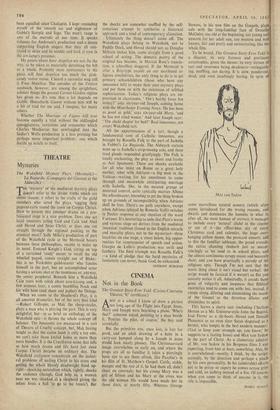CINEMA Not in the Book
The Greatest Story Ever Told. (Casino Cinerama Theatre, `IJ' certificate.)
AA BOY at a school I know of drew a picture ,.not long ago of the Flight into Egypt. Jesus, Mary and Joseph were boarding a plane. 'Who's that?' someone asked, pointing to a man beside it. `Pontius the pilot, of course,' the boy said scornfully.
But the primitive eye, once lost, is lost for good, and an adult drawing of a baby in a carry-cot humped along by a Joseph in jeans would look nicely phoney. The Christmas-card image overwhelms us early on, and where the props are all so familiar it takes a piercingly basic eye to see them afresh, like Pasolini's in his film of St. Matthew's Gospel. Cattle, stable, manger and the rest of it, he had them all, didn't cheat on externals; but his young Mary was a girl of fifteen and his Mary at the cross was the old woman life would have made her in those days, at nearly fifty. Whereas George Stevens, in his new film on the Gospels, plays safe with the long-familiar face of Dorothy McGnire, too old at the beginning, too young and unworn for her adult son, too western and well known, fair and pretty and uninteresting, like the whole film.
To be brutal, The Greatest Story Ever Told is a disaster, its very fairness and prettiness catastrophic, given the theme; its very virtues of tact and reverence being deadeners—extinguish- ing, muffling, not daring. It is slow, ponderous, dead, and even insultingly boring. In spite oi
some marvellous natural scenery (which often seems introduced for the wrong reasons, and dwarfs and dominates the humans in what is, .after all, the most human of stories), it manages to include every `natural' cliché in the cinema or out of it—the vtivet-blue sky of every Christmas card and calendar, the huge over- hanging yellow moon, the postcard sunsets; add to this the familiar tableaux, the posed crowds, the extras chanting rhubarb just as uncon- vincingly as we used to in school plays, and the almost continuous syrupy music and heavenly choir, and you have practically a parody of the religious epic. Though I'm not sure that the worst thing about it isn't visual but verbal: the script would be farcical if it weren't so flat you scarcely notice it all. Admittedly, it avoids those gems of vulgarity and ineptness that Biblical enormities tend to come out with; but, instead, it creeps along, diluting and diminishing the words of the Gospel as the direction dilutes and diminishes its spirit.
This leaves a starry cast (including Charlton Heston as a Mr. Universe-style John the Baptist, Jos6 Ferrer as a sly-boots Herod and Donald Pleasence as an even slyer Satan disguised as 3 hermit, who tempts in the best modern manner: ('Got to keep your strength up, you know,' be.
suggests to a fasting Jesus) and Max von Sydow in the part of Christ. As a clamorous admirer
of Mr. von Sydow in his Bergman films I wag expecting, from him at least, something. Alas, he is overwhelmed—mostly, I think, by the script; F.
secondly, by the direction and perhaps a pinch by his own personality. In his (admirable) efforts
not to be prissy or sugary he comes across grirn and cold, an iceberg instead of a fire. Of course, when you come to think of anyone in it, the role is impossible.
Max von Sydow
ISABEL ot






























 Previous page
Previous page